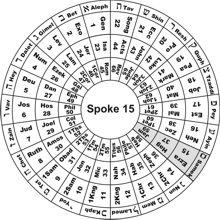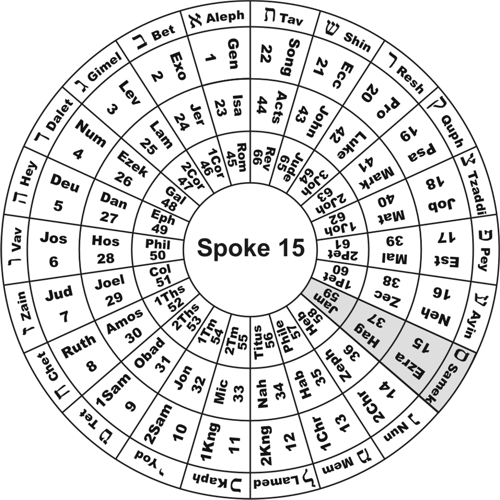Samek and the Books on Spoke 15
If a brother or sister be naked, and destitute of daily food, And one of you
say unto them, Depart in peace, be ye warmed and filled; notwithstanding ye give them
not those things which are needful to the body; what doth it profit? Even so faith, if
it hath not works, is dead, being alone.
James 2:15 (Spoke 15, Cycle 3)
Samekh Alphabetic Verses
The great theme of Spoke 15 is encoded in the name of the Fifteenth Letter,
סמך (samekh), which is variously
translated in the KJV as support, uphold, sustain,
establish, or stand fast. God used it four times
in the Alphabetic Verses, so
its meaning is established beyond all doubt. The verses are:
- AV Ps 111:8a They stand fast for ever and ever, and are done in truth and uprightness.
- AV Ps 112:8a His heart is established, he shall not be afraid,
until he see his desire upon his enemies.
- AV Ps 119:116 Uphold me according unto thy word, that I may live: and let me not be
ashamed of my hope.
- AV Ps 145:14 The LORD upholdeth all that fall, and raiseth up all those that
be bowed down.
The same idea is found in another Samekh KeyWord סעד (sa'ad) which is variously
translated as uphold, support, or sustain. This word also appears in
the Samekh section of Psalm 119:
- AV PS 119:117 Hold thou me up, and I shall be safe: and I will have respect
unto thy statutes continually.
The discussion of the meaning of Samek from the Bible Wheel book is reproduced online in the article called
Samek: The Symbol of Help and Support.
Book 15: Ezra (Helper)
The divine integration of the meaning of Samek with Spoke 15 is amazing to behold. The name
of the first book
on Spoke 15, עזרא (Ezra), comes from the root עזר (ezer),
which means help. God linked ezer
with samekh (the root of the name of the 15th letter) in three verses:
Behold, God is mine helper: the Lord is with them that uphold my soul.
Psalm 54:4
And I looked, and there was none to help; and I wondered that there was
none to uphold:
therefore mine own arm brought salvation unto me; and my fury, it upheld me.
Isaiah 41:10
Fear thou not; for I am with thee: be not dismayed; for I am thy God:
I will strengthen thee; yea, I will help thee; yea, I will uphold thee with the right
hand of my righteousness.
Isaiah 63:5
This scriptural link between ezer and the meaning of the
letter Samekh manifests in the appearance of the
Book of Ezra on Spoke 15 of the Wheel. This then links to the Inner Cycle of Genesis and the first appearance
of Eliezer (God is My Helper) in Genesis 15. It also establishes the theme of the opening verse of Romans 15
Yet the link between Spoke 15 and the Letter Samekh goes well beyond this.
The word ezer also appears in the text of
Ezra as part of one of its dominant themes. As a leader of God's people, Ezra
knew the absolute necessity of relying utterly upon the Lord for his direction,
his help, and his sustenance lest his so-called faith be revealed as vanity, a
sham. Like an Old Testament version of the Apostle James, he knew it was
essential that his actions matched his words. Therefore, when faced an option to seek
help at the expense of his word, he chose the way of God, as it is written:
Then I proclaimed a fast there, at the river of Ahava,
that we might afflict ourselves before our God, to seek of him a right way for
us, and for our little ones, and for all our substance. For I was ashamed to
require of the king a band of soldiers and horsemen to help
(עזר)
us against the enemy in the way: because we had spoken unto the king, saying,
The hand of our God is upon all them for good that seek him; but his power and
his wrath is against all them that forsake him.
Ezra 8:21f (Spoke 15, Cycle 1)
This is characteristic of the Old Testament; each
book typically contains one or more verses where a word relating to the meaning
of the prophet's name is used as part of the theme. See also Ezra the Helper.
James: Help Thy Brethren!
Moving down Spoke 15 from Cycle 1 to Cycle 3, we find the full spiritual implications
of this theme - enacted by Ezra in the history Israel - explained in the
first chapter of the Book of James:
For if any be a hearer of the word, and not a doer,
he is like unto a man beholding his natural face in a glass: For he beholdeth
himself, and goeth his way, and straightway forgetteth what manner of man he
was. But whoso looketh into the perfect law of liberty, and continueth therein,
he being not a forgetful hearer, but a
doer of the work, this man shall be blessed in his deed. If any man among
you seem to be religious, and bridleth not his tongue, but deceiveth his own
heart, this man's religion is vain.
Pure religion and undefiled before God and the Father is this, To
visit the fatherless and widows in their affliction, and to keep himself
unspotted from the world.
James 1:23f (Spoke 15, Cycle 2)
The Book of James bears distinctive characteristics
that set it apart from all other books in the New Testament. It is a corrective
to potential abuse of the doctrines of solo
gratia and sola fide, that is,
that salvation is by grace alone
through faith alone. James' strong
emphasis upon the importance of actually doing good works greatly confused
Luther who could not reconcile this with Paul's plain teaching that "by
grace are ye saved through faith; and that not of yourselves: it is the gift of
God: Not of works, lest any man should boast." His inability to see
God's purpose in James was so strong that he called this great book "an
epistle of straw." Yet now, in light of its integration with Hebrew alphabet
and the other books of the Bible, we can see how perfectly it fits within the
whole of God's revelation.
The ultimate significance of this theme of support
and help is set forth in the second chapter of James:
What doth it profit, my brethren, though a man say he hath faith, and have not works? can faith save
him? If a brother or sister be naked, and destitute of daily food, And one of
you say unto them, Depart in peace, be ye warmed and filled; notwithstanding ye
give them not those things which are needful to the body; what doth it profit?
Even so faith, if it hath not works, is dead, being alone.
James 2:14 (Spoke 15, Cycle 2)
These verses reveal, in the plainest language
possible, the fundamental significance of the letter Samekh ( ).
Each Spoke is governed by its corresponding Hebrew letter with the same elegant
simplicity displayed here, resulting in the divine integration of the entire
Bible with the 22 letters upon the eternal pattern of the Wheel. As should be
clear from this brief introduction, the cosmic significance of the letters can
not be overstated. They provide nothing less than the true Key to the full
revelation of the Wheel of God's eternal Word (see Support thy Brethren!). ).
Each Spoke is governed by its corresponding Hebrew letter with the same elegant
simplicity displayed here, resulting in the divine integration of the entire
Bible with the 22 letters upon the eternal pattern of the Wheel. As should be
clear from this brief introduction, the cosmic significance of the letters can
not be overstated. They provide nothing less than the true Key to the full
revelation of the Wheel of God's eternal Word (see Support thy Brethren!).
|



